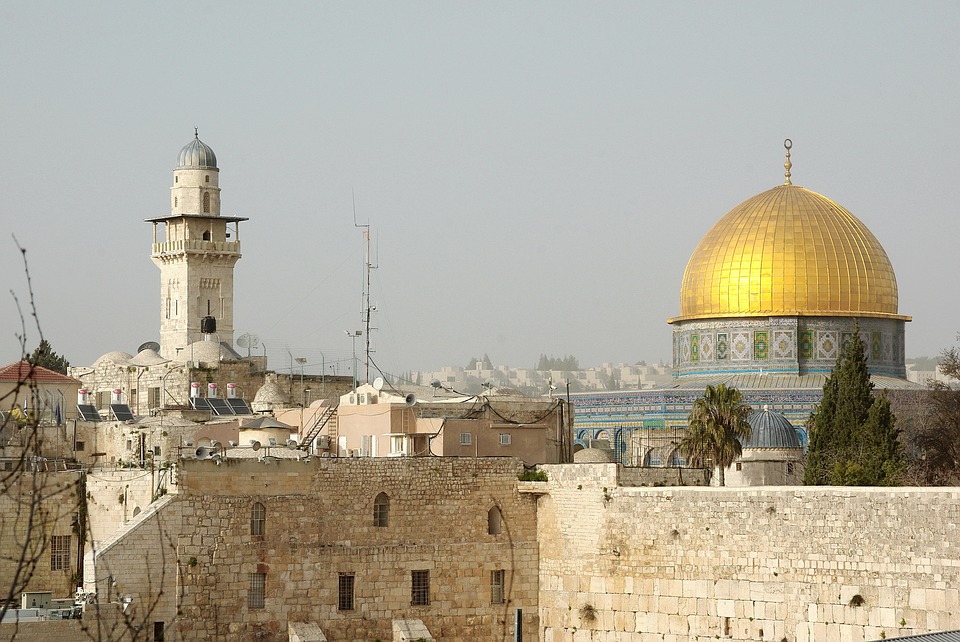Peace to Prosperity Summit in Bahrain
July 10, 2019 | Expert Insights

Background
The status of Jerusalem is the most contested issue between Israel and the Palestinians.
Israel conquered Arab East Jerusalem in the 1967 Six-Day War and later annexed it. Israel considers east Jerusalem an indivisible part of its capital, while the Palestinians seek the area, home to the city's most sensitive holy sites, as the capital of a future state. The international community has maintained that the city’s status should be negotiated between Israel and the Palestinians.
Israel has built a dozen settlements in East Jerusalem which is considered illegal under international law, though Israel disputes this.
On December 6, 2017, US President Donald Trump announced the United States recognition of Jerusalem as the capital of Israel and ordered the planning of the relocation of the U.S. Embassy in Israel from Tel Aviv to Jerusalem.
The Manama workshop 2019 was meant to facilitate discussions on achievable vision and framework for a prosperous future for Palestinians, including enhancements to economic governance, development of human capital, and facilitation of rapid private-sector growth.
Analysis
The long-awaited rollout of the Trump administration’s new approach to the Palestinians began with the release of the “Peace to Prosperity” economic plan.
The conference concentrated on the economic portion of the US administration’s plan to resolve the Israeli-Palestinian conflict, which includes proposals for more than $50 billion of investment over the next ten years in the West Bank, the Gaza Strip and neighbouring Arab countries.
Among the 179 proposed infrastructure and business projects is a $5bn transportation corridor to connect the West Bank and Gaza. Some of them have been floated previously and stalled for lack of underlying political or security agreements. Christine Lagarde, the managing director of International Monetary Fund said at the opening panel session of the Bahrain conference, that the fund's experience in conflict-riven countries showed it could be a struggle to generate economic growth in such an environment.
Kushner and Trump’s Mideast envoy Jason Greenblatt said the political elements would be unveiled later, possibly after a second snap Israeli election set for September.
Palestinian leaders boycotted the conference and refused to engage with the White House — accusing it of pro-Israel bias after US President Donald Trump recognized Jerusalem as Israel’s capital in 2017.
Few Palestinian businessmen attended the summit. Ashraf Jabari, a Hebron based businessman with ties to Israeli settlers and US Ambassador to Israel David Friedman, spoke on one of its panels. Jabari has faced intense criticism for his relations with Israeli settlers and is often derided as being outside of the Palestinian mainstream. The US-led economic workshop in Bahrain aims to pave the way for the establishment of a Palestinian “emirate” in the Gaza Strip, Palestinian Authority presidential spokesman Nabil Abu Rudaineh said. He added that the “emirate” would be expanded and separated from the West Bank.
The Palestinian Liberation Organization (PLO) reiterated its rejection of the $50bn plan, saying the proposal's lack of political vision guarantees its failure. The statement said the US wanted to sell a "mirage of economic prosperity" which would only perpetuate the Palestinians' "captivity". It accused the White House of using the workshop as cover for Israel's efforts to achieve normal relations with Arab states and grow its illegal settlements in the occupied West Bank.
Counterpoint
The Trump administration has cut off funds for the Palestinian Authority, making it ineffective. The US has also reduced its funding for the UNRWA substantially — the UN agency that takes care of the needs of displaced Palestinians, thus making UNRWA, desperately seeking assistance or suspending its activities in many areas. These previous moves counter the very intent of the deal of the century which is to provide a framework for a prosperous future for Palestinians.
Assessment
Our assessment is that the forum was forming an Arab-Islamic-Israeli alliance with an eye towards containing Iran’s regional posture and activities. The ‘Deal of the Century’ was delivered on the condition that no Israeli officials would be present. We believe that the plan appears to be presented in a vacuum in which Israel’s role is hidden from view.
Also, after Israel’s creation in 1948, Jordan absorbed more Palestinians than any other country. Its weakened economy could likely compel the kingdom to accept the prised deal for resettlement of Palestinian refugees in Jordan. We feel that initiative could lead to more polarization in the Arab world. To signal their dissatisfaction with the agenda of the workshop, most countries have sent no rank higher than deputy minister.








Comments